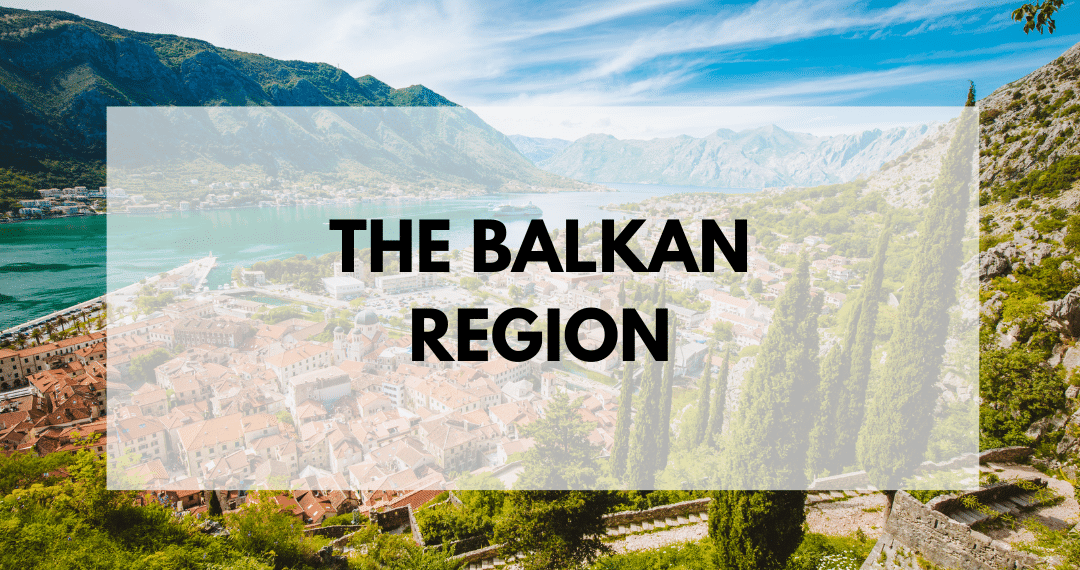In the heart of Southeastern Europe, the Balkans are a region of remarkable cultural diversity, vibrant history, and an intriguing linguistic landscape.
At the same time, the Balkan region, with its unique fusion of traditions and languages, is a dynamic hub for business and trade.
The economy of the Balkan region is characterized by considerable economic diversity, with various sectors, such as agriculture, manufacturing, and services, experiencing growth.
Due to the countries’ long history and unique traditions, tourism is a significant contributor to the economy in several Balkan countries.
What’s more, there has been a growing focus on infrastructure development and foreign investment in recent years, which makes the Balkans even more attractive for foreign businesses.

To unlock, however, all the economic opportunities that the region offers, one needs to understand the pivotal role that languages play in fostering successful business relationships.
This blog will delve into the languages spoken in the Balkans and why they are essential for thriving in this diverse and rapidly developing business environment.
Also Read : Professional document translation services.
Connect with your customers in the Balkans in their native languages
Milestone helps you seamlessly translate content & localize your website, products, and services for more reach, better conversions, and greater sales.
What is the Balkans?
The Balkan region, located in Southeastern Europe, is a diverse and historically rich area known for its complex geopolitics.
The region includes a group of countries that have strong cultural and historical ties, despite their differences.
Some of the key countries in the Balkans include Albania, Bosnia and Herzegovina, Bulgaria, Croatia, Greece, North Macedonia, Montenegro, and Serbia.

Some experts claim that Romania, Slovakia, and parts of Turkey also belong to the region.
The Balkan countries share a dynamic history revolving around empires, conflicts, and shifting borders. The region is known for its linguistic diversity, with a range of languages spoken (keep reading to find out more!).
The Balkans have played a significant role in European history and continue to be a prominent part of the continent’s cultural and linguistic heritage.
Also read: Top 10 Most Spoken Languages in Europe
The most widely spoken languages in the Balkans
Serbo-Croatian (Bosnian, Croatian, Montenegrin, Serbian)
The Serbo-Croatian language is spoken by approximately 20 million people in the Balkans.
It is mainly used in Croatia, Serbia, Bosnia and Herzegovina, and Montenegro. It’s important to note that each country has its own standard language variety, with its own vocabulary, pronunciation, and script.
Historically, Serbo-Croatian was considered a single language with regional variations, but political and linguistic differences have led to the recognition of separate standard varieties.
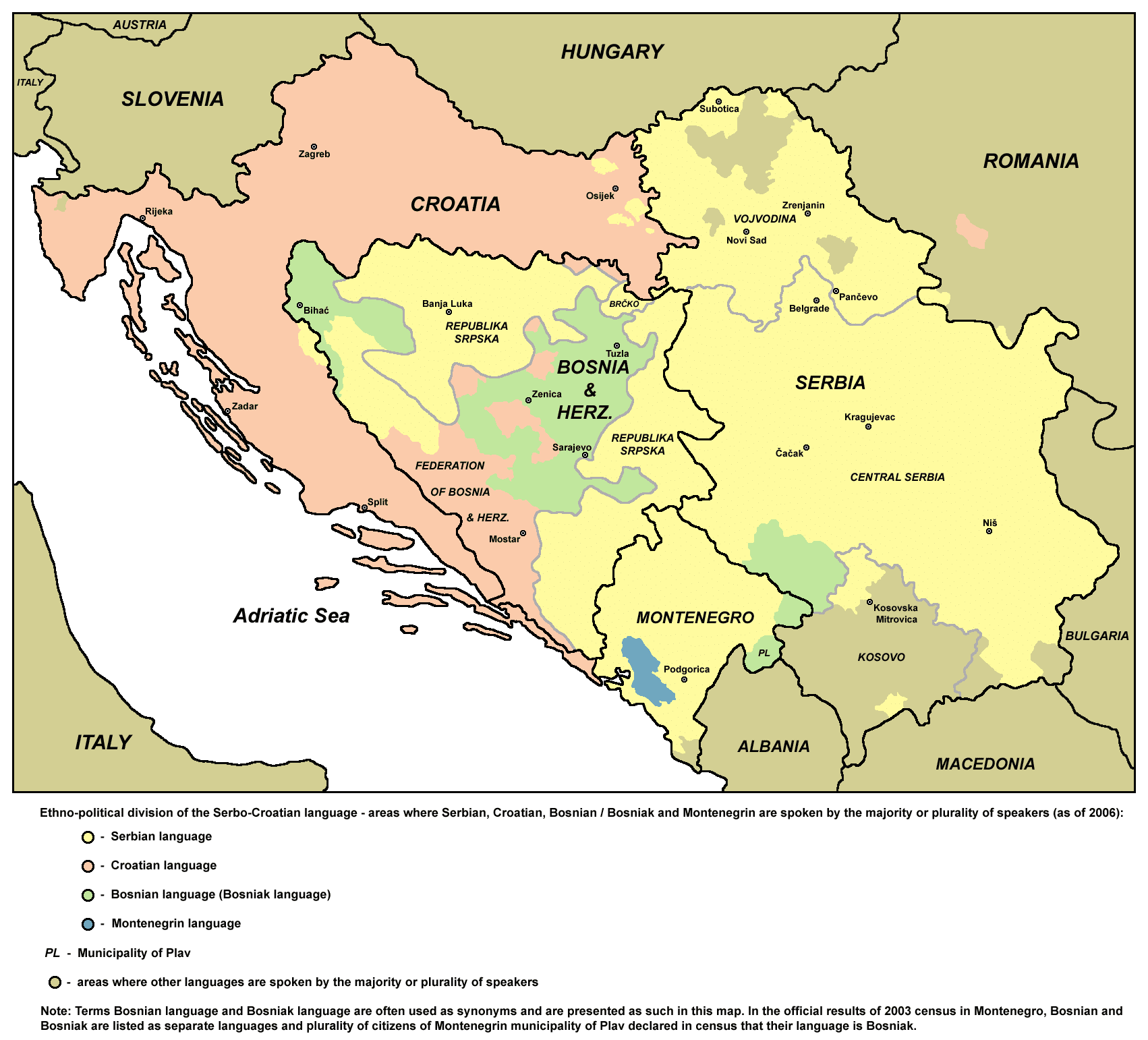
Also read: Top 10 Subtitling Companies : How To Choose The Right One
These language varieties share a common linguistic heritage and remain mutually intelligible to a very high degree. The distinction between them primarily revolves around vocabulary, pronunciation, and, to some extent, script.
For example, the Croatian and Bosnian language varieties typically use the Latin script, while the Serbian and Montenegrin use both the Latin and Cyrillic scripts.
The history of these languages is deeply intertwined with the complex historical and political developments in the region.
As a result, the Serbo-Croatian language and its varieties reflect the influence of various empires, including the Ottoman and Austro-Hungarian empires, as well as the subsequent nation-building processes.
Greek
With around 12 million speakers in the Balkans, Greek is the official language of Greece and Cyprus.
While most Greek speakers are located in Greece, the language is also spoken in some communities in Albania and North Macedonia, particularly in areas bordering Greece.
Greek is written in the Greek alphabet, which has a rich historical tradition that stretches back over three millennia.
Greek is one of the world’s oldest languages, dating to around 1400 BCE. Ancient Greek is often regarded as the language of classical literature and philosophy, with works by Homer, Plato, and Aristotle playing a prominent role in shaping Western philosophical movements.
The conquests of Alexander the Great led to Greek spreading and, consequently, becoming a lingua franca in the Hellenistic period. What’s more, Greek was known as the language of administration, scholarship, and the Eastern Orthodox Church.
The modern Greek language, which is spoken today, has evolved from medieval Koine Greek. In the 19th century, it was revived, and the modern Greek alphabet was adopted as a script.

Also read: 10 Interesting Facts about Greek: Origin & Evolution
Albanian
There are about 5 million Albanian speakers in the Balkans, with Albanian being the official language of Albania. The language is also spoken by Albanian communities in Kosovo, North Macedonia, Montenegro, and parts of Serbia.
Albanian uses the Latin alphabet.
Historically, it has also used the Greek script. This shift in Albanian writing occurred primarily due to the Albanian national and cultural awakening during the late 19th and early 20th centuries.
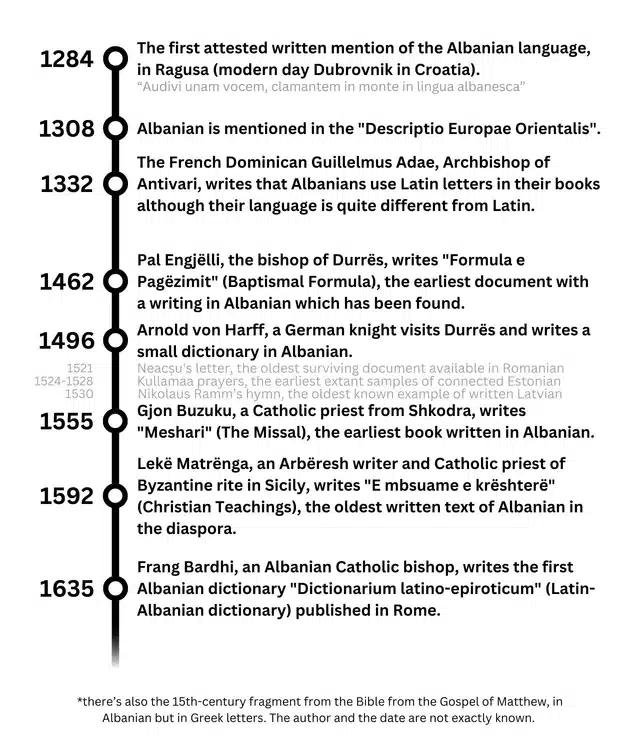
The Latin script was seen as a symbol of national pride and a way to detach from the influence of the Greek and Ottoman empires. In addition, intellectuals and educators advocated for the Latin alphabet to promote literacy and align Albania with European cultural and political developments.
This transition marked a pivotal moment in Albanian history. The shift to the Latin script was a huge step for the Albanian nation in developing a standardized Albanian literary language and fostering a sense of national identity.
Bulgarian
The Bulgarian language is spoken by approximately 4.5 million people in the Balkans, primarily in Bulgaria.
It is also spoken in parts of Serbia (mainly in the Timok Valley), North Macedonia, and Greece.
Bulgarian uses the Cyrillic alphabet, which makes it distinct from the scripts of neighbouring languages.
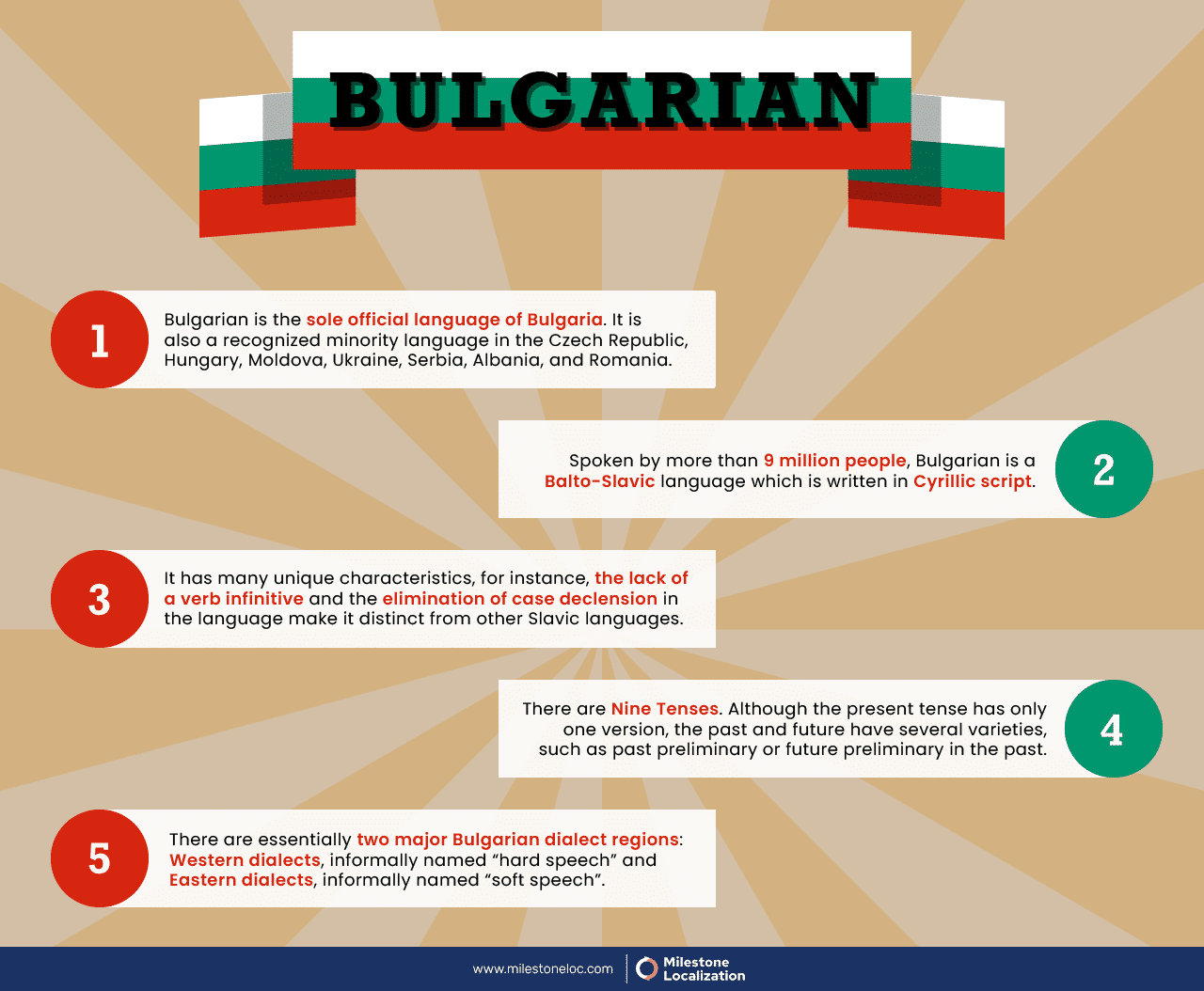
Also read: Bulgarian vs Russian : Differences & Similarities
Connect with your customers in the Balkans in their native languages
Milestone helps you seamlessly translate content & localize your website, products, and services for more reach, better conversions, and greater sales.
Romanian
With around 1.5 million speakers in the Balkans, Romanian is the official language of Romania. It is spoken in some communities in Moldova and Serbia, particularly in the Banat region. In total, there are 24 million Romanian speakers in the world.
Romanian uses the Latin alphabet and is a Romance language.
Its roots are in the Latin language, which was brought to the region by the Roman Empire’s colonization and got mixed up with the Dacian and Slavic languages in the region.
Over the centuries, through interactions with various neighbouring cultures, the Romanian language evolved. It incorporates numerous Slavic and Hungarian loanwords and has adapted its vocabulary and grammar.
Thus, Romanian is a unique Romance language due to its Eastern European characteristics.
The writing system transitioned from Cyrillic to Latin in the 19th century, which further solidified the country’s ties to Western Europe.
Also read: Germanic Languages: Origin, Similarities & Differences
Turkish
Turkish has approximately 2.5 million speakers in the Balkans. Turkish is primarily spoken in parts of Bulgaria, Greece, North Macedonia, and Kosovo, where Turkish-speaking communities exist.
In the world, there are around 75 million Turkish speakers.
Turkish is written in the Turkish variant of the Latin alphabet.
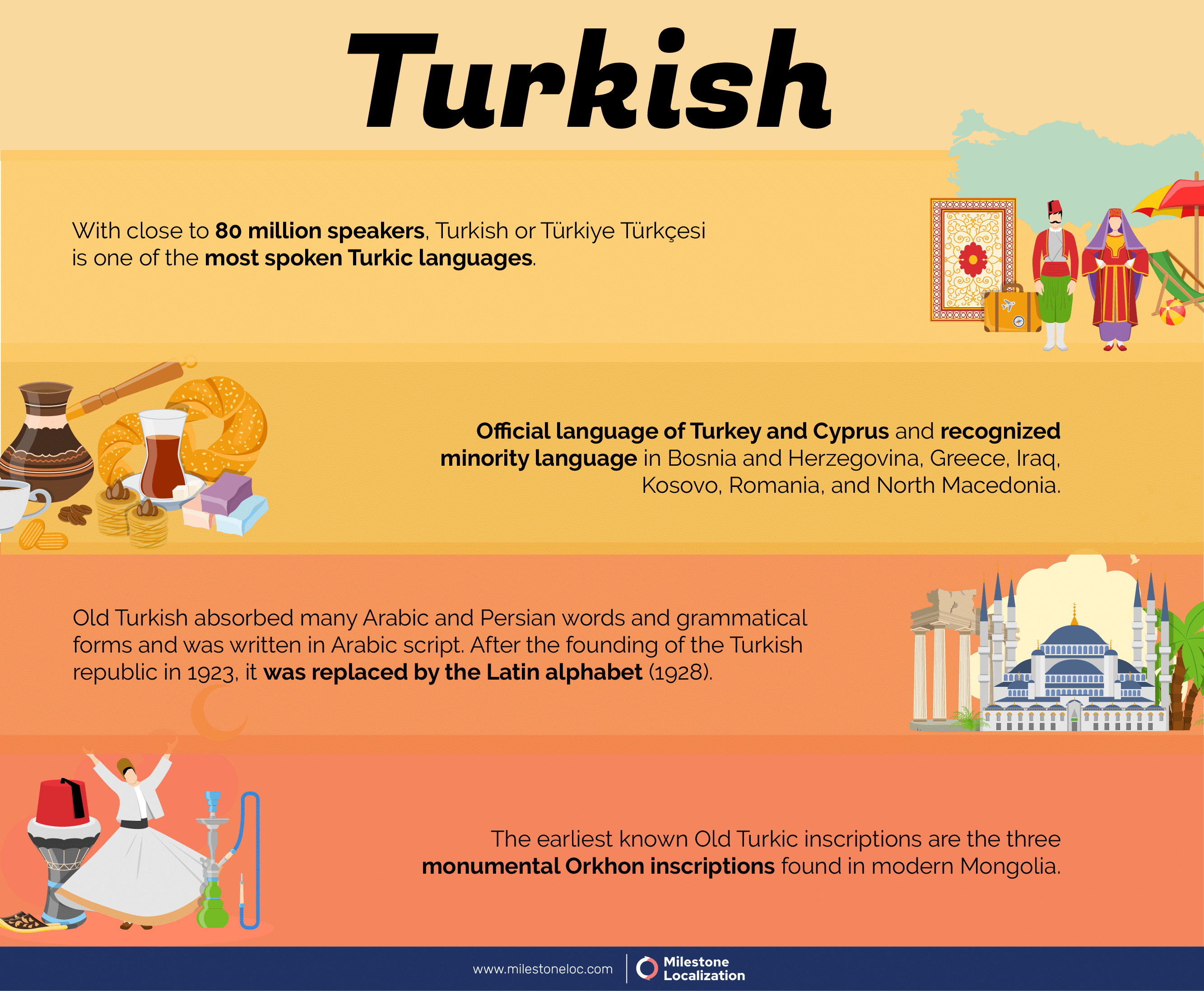
Although Turkish is not an official language in any Balkan country, it has left its mark on the Balkan region and loanwords are very common in all Balkan languages.
The history of the Turkish language in the Balkan region goes back to the Ottoman Empire. Turkish, with its roots in the Turkic languages, became the dominant language in the region during the Ottoman Empire’s expansion in the late 14th century.
As the Ottomans conquered the Balkans, Turkish became the administrative and cultural language of the empire. It coexisted with various local languages and exerted an influence on their development.
Turkish has remained a part of the linguistic landscape of the Balkans even today and can still be seen in regions of Bulgaria, Greece, North Macedonia, and Kosovo, where Turkish-speaking communities exist.
Also read: What Are The Languages Spoken In Greece?
Macedonian
Macedonian is spoken by approximately 2 million people. In North Macedonia, it serves as the official language.
Macedonian is also spoken by Macedonian communities in parts of Bulgaria and Albania. It uses the Cyrillic alphabet, similar to Bulgarian but with some differences.
Macedonian is a South Slavic language that has evolved from the local Slavic dialects.

During the Ottoman period, Macedonian persisted as a spoken language, while it was heavily influenced by the Greek-, Serbian-, and Bulgarian-speaking communities in the region.
In the 20th century, the Macedonian language was officially standardized and established as the standard language we know today.
Aromanian
Aromanian, also known as Vlach, is a Romance language with 1.5 million speakers across the Balkans.
Aromanian speakers are located in parts of Greece, Albania, North Macedonia, and Serbia.
Aromanian is typically written in the Latin script, which reflects its Romance linguistic heritage.

Aromanian evolved from the Latin language brought by the Romans to the Balkans and consequently developed as a distinct language since its speakers were isolated in the mountainous and rural areas of the Balkan region.
Through the centuries, the Aromanian language was heavily influenced by the Greek, Slavic, and Albanian languages.
Also read: Slavic Languages: Everything You Need To Know
Is English spoken in the Balkan region?
English is spoken to varying degrees across the Balkans. However, it’s not an official language in any Balkan country.
In fact, English is predominantly spoken by the younger, educated populations and in urban areas.
The English language is often used in international business communication. However, relying solely on English may not be the best solution for foreign businesses looking to expand in the Balkans.
While English proficiency is increasing, it may not be sufficient to navigate local regulations, complex business environments, and especially local cultures.

Also read: Languages Spoken In Texas & Its Bilingual Education System
In the Balkans, building strong relationships and understanding the local customs are essential for long-term success.
And while English could help you in those aspects to a certain extent, it is best to use the local languages.
In fact, according to statistics, countries like Bulgaria, Serbia, Croatia, and Greece have high to very high proficiency in English. But these are only four countries from the region.
Keep in mind that not all local employees or stakeholders may have a high level of English proficiency. This, in turn, makes local language skills incredibly valuable for effective communication and long-lasting relationship building.
How to do business in the Balkan region?
Doing business in the Balkans can be challenging, but with the right approach, everything is possible!
Indeed, to successfully navigate this region’s business landscape, it’s crucial to consider various factors, from cultural understanding to local partnerships.
Here are some key guidelines for businesses that are looking to establish their presence in the Balkans:
Cultural Understanding and Sensitivity: A deep appreciation and understanding of the diverse cultures and languages in the region is essential, as this will help you build trust and successful partnerships.
What’s more, respecting the local cultural norms and traditions as well as understanding the historical context of the region can help you avoid misunderstandings.
Local Language Skills: While English is not uncommon in business environments, knowing the local language(s) or having access to translation services can enhance communication and relationships.
Understanding the Bureaucracy: Be prepared for bureaucratic processes, regulations, and occasional administrative hurdles. In such situations, patience and local knowledge are essential.
Understanding the Legal Framework: Familiarise yourself with local laws, regulations, and business practices, and consider legal and financial advice from local experts.
Market Research and Networking: Make sure you have thoroughly researched the specific markets in the Balkans in order to understand consumer preferences, competition, and market trends. Building strong connections to local business associations and government agencies can be advantageous in this regard.
Adaptability and Risk Management: In any business plan, it is crucial to evaluate any possible political and economic risks. What’s even more important is to have contingency plans in place to mitigate potential challenges.
Since markets can be quite dynamic, it is advisable to stay open to change, as business environments can evolve rapidly, and adaptability could turn out to be the key to success.
By considering these factors, businesses can navigate the complexities of the local market while successfully harnessing the unique array of opportunities that the Balkans have to offer.
Conclusion
In conclusion, local languages are the key to success when doing business in the Balkans.
Knowledge of the local languages enables a deeper understanding of the region’s culture, history, and people.
While English can help you get around, it’s the local languages that build trust and facilitate meaningful connections. Thus, they are essential for navigating the local business landscape in this diverse and dynamic region.
In this regard, translation can be a valuable tool in overcoming language barriers and taking advantage of all the opportunities that the Balkan region can offer for your business!
Also read: Nordic Languages: History, Similarities, and Differences
Connect with your customers in the Balkans in their native languages
Milestone helps you seamlessly translate content & localize your website, products, and services for more reach, better conversions, and greater sales.

